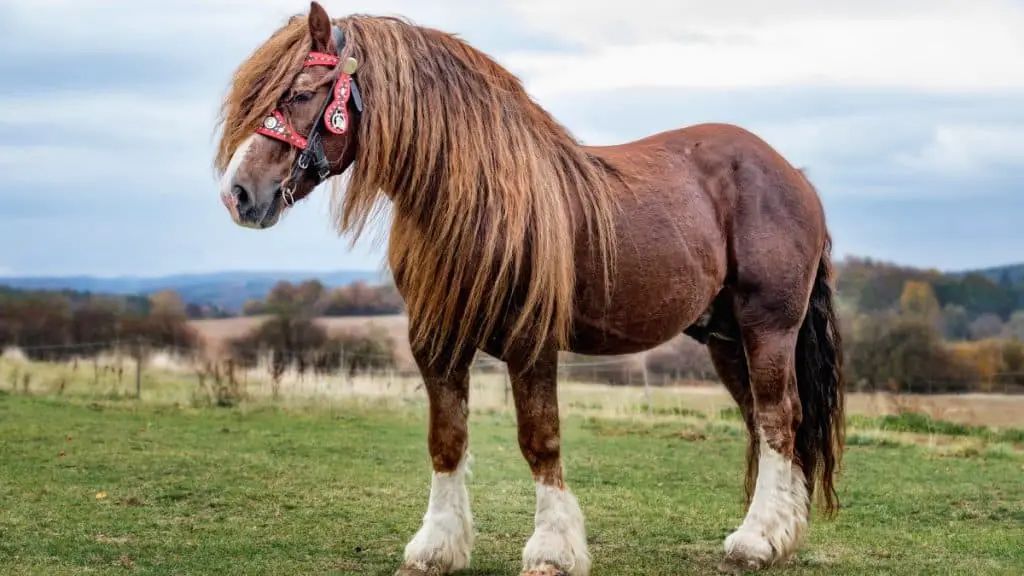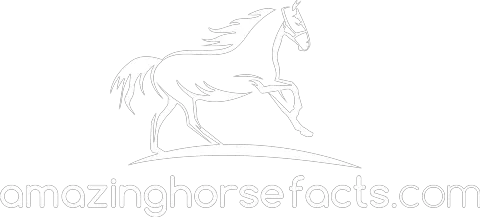Skip To Section
If you have ever asked the question when do horses stop growing, you’re quickly going to find out that there is not a simple answer because it depends on a few different factors, including the breed.
However, most horses are considered adults when they reach the age of four and stop growing taller between four and five years old.

How To Know If Your Horse Has Stopped Growing
It’s important to know whether your horse is still growing for a number of reasons, but most importantly, many riders base their training schedule on whether their horse has reached their full adult height.
It can be surprisingly tricky to know if your horse has finished growing because most horses put on a lot of height fast, and then they grow much slowly for quite a long time. If you’re used to your foal shooting up, you might be taken aback to learn that they’re still growing even once that has stopped.
In fact, horses generally take years to reach their full height. Even once your horse has reached its final height, it is likely to fill out a bit, because its bones are still growing and maturing.
Most horses reach their maximum height by the age of five, but they are likely to gain in weight and strength even after that. The only real way to see whether a horse has completely stopped growing and fully developed is to get x-rays taken.
When Will Your Horse Stop Growing?
Growth does also depend on the breed to some degree, so you might find it useful to check out the below table, showing the average age at which they stop growing.
Remember that it will still vary considerably depending on the individual, their parentage, and sometimes even the gender. The following is just a rough guide to give you a general idea.
| Breed | Age They Reach Full Growth |
| Quarter Horse | 5-7 years |
| Draft Horses | Up to 8 years |
| Thoroughbred Horses | 4-6 years |
| Arabian Horses | Around 6 years old |
Larger horses, unsurprisingly, tend to take longer to reach their full height. You might think your horse is fully grown, but if it hasn’t yet reached the average number of growth years for its breed, it may surprise you by continuing to grow!
How Do You Measure A Horse?
If you aren’t able to go down the x-ray route but really want to know when your horse has stopped growing, the best thing to do is start measuring them on a regular basis and keeping a record of your findings.
You should then be able to tell when their growth is slowing down and stopping.
This will usually be a gradual process, so keep measuring them over a period of months to make sure they really have stopped.
You can measure your horse s growth using a simple tape measure, or you can buy a special measuring stick. Get your horse to stand on a flat, solid surface, and if you’re using a tape measure, get a friend to help you – you can’t do it alone.
One of you needs to hold the tape measure on the ground, while the other should stretch it in a straight line up to the horse’s shoulder.
Take note of how many inches tall your horse is, and then divide this by four. This will tell you how many “hands” tall your horse is. Horses are always measured in hands.
Paying attention to the girth of your horse can also help you tell when they have stopped growing – if you’re not feeding them excessive amounts of treats, that is.
You can measure around your horse’s legs and body and keep records of their growth. This may help you determine when they have finished “filling out” as well as finished gaining height.
When Can You Start Riding A Horse?
Obviously, all responsible horse owners want to ensure a horse is in perfect condition before they consider letting anyone ride the horse, or even start training a horse to take a rider. This isn’t just about how tall a horse is, however.
You need to take a horse’s height and weight into account when you consider riding them, and you should also think about their emotional maturity.
Anyone who has owned young horses will know that they are often playful, curious, and focused on learning the things they want to learn – rather than the things their owners want them to learn.
Horses have such different temperaments and physiques that it can be difficult to judge exactly when a horse is ready to be ridden, but usually, horses around three or four have matured enough both physically and emotionally to start taking riders, even if they haven’t yet managed to reach their full growth potential.
You should base your judgment on other factors than just the horse’s height.
Knowing and understanding the different stages of growth is a crucial aspect of responsible horse ownership, and you should found your understanding on thorough research, not tradition.
Most horse’s knee bones fuse when they are around two years old, and this is an important milestone for them to reach before they are ready to be ridden. This fusion gives them the ability to bear extra weight, and riding them before the knees have fused could cause injury.
Most horse owners will check their horse’s knees have fused before they start training them to ride.
Frequently Asked Questions
Will A 3-Year-Old Horse Grow Anymore?
Yes, as mentioned above, a 3-year-old horse may have gained most of its height, but it will continue to grow for another year or two, or even more (depending on the breed).
Horses keep growing until they are five, six, seven, or even eight years old.
They also grow in mental maturity, so if your 3-year-old-horse is still acting like a toddler, don’t despair! They have time yet!
How Can You Tell How Big A Horse Is Going To Be?
Anyone who has ever considered buying a young horse has asked this question: how big will my horse grow? Unfortunately, this is another difficult question with no easy answer, because once again, it depends a bit on the individual horse and on what breed it is
That said, there are some tricks you can use to give yourself an idea. Horses tend to resemble their parents (just like people!) so if its parents are very tall, it is likely to be tall as well. If it resembles its mom more closely than its dad, consider her height, and vice versa.
You can also look at a horse’s siblings, especially if they share the same parents. This may help you gauge what your horse s height is likely to be when it has finished growing.
Next, remember that horses do gain most of their height in their early years, even if they continue filling out and developing later. Many horses gain 75% of their height in their first year and up to 90% in the following year.
That means that if your horse is a giant or a dwarf by the time they are about two, they are probably going to stay that way, even if they’ll gain a little bit more height in the coming years.
Finally, look at the foal’s legs. All foals look lanky and leggy, but these can give you an indication of how tall they are going to be as adults. If they have especially long legs, you can be fairly sure that they will be particularly tall adults.
At What Age Do Stock Horses Stop Growing?
Like many of the heavy breeds, stock horses can grow for a surprising amount of time. Some stock horses don’t stop growing until they are eight years of age!
That may sound astonishing, but when you look at how much muscle and weight they need to gain, perhaps it isn’t.
If you go a long period of time without seeing a horse, you might be astounded by how much they have grown. When you see them every day, you don’t notice it much, but a gap between visits can make the growth very much more pronounced.
When Is A Horse Generally Considered A Teenager?
On the whole, a horse is considered a teenager or adolescent between about two and three years old. They have gained most of their height by then, but they are still filling out, and will still be keen to play and frisk.
While you can start introducing them to some training concepts, remember that they’re still youngsters and don’t expect too much of them.
Conclusion
When your horse stops growing is going to depend a lot on the breed and the individual in question, but it’s safe to assume that your horse is still going to be growing at least a little by the time they reach four years old.
Remember to take emotional maturity into account when thinking about your horse’s growth, and if you have one of the heavier breeds, bear in mind that they could keep getting bigger for nearly a decade!

